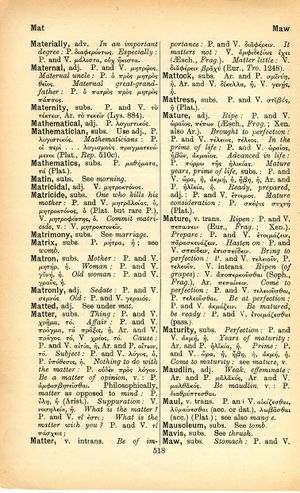matter
Εὐφήμει, ὦ ἄνθρωπε· ἁσμενέστατα μέντοι αὐτὸ ἀπέφυγον, ὥσπερ λυττῶντά τινα καὶ ἄγριον δεσπότην ἀποδράς → Hush, man, most gladly have I escaped this thing you talk of, as if I had run away from a raging and savage beast of a master
English > Greek (Woodhouse)
substantive
affair: P. and V. πρᾶγμα, τό, πρᾶξις, ἡ, Ar. and V. πρᾶγος, τό, V. χρέος, τό.
cause: P. and V. αἰτία, ἡ, Ar. and P. αἴτιον, τό.
subject: P. and V. λόγος, ὁ, P. ὑπόθεσις, ἡ.
nothing to do with the matter: P. οὐδὲν πρὸς λόγον.
be matter of opinion, v.: P. ἀμφισβητεῖσθαι.
philosophically, matter as opposed to mind: P. ὕλη, ἡ (Arist.).
suppuration: V. νοσηλεία, ἡ.
what is the matter? P. and V. τί ἐστι;
what is the matter with you? P. and V. τί πάσχεις;
verb intransitive
be of importance: P. and V. διαφέρω, διαφέρειν.
it matters not: V. ἀμφιδεξίως ἔχει (Aesch., Fragment).
matter little: V. διαφέρω βραχύ (Eur., Troades 1248).

